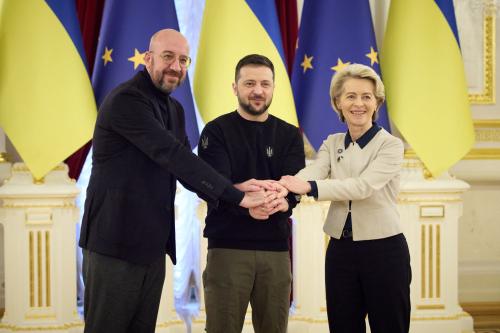Two political rivals are coming to the White House. The prime minister of Poland, Donald Tusk, and the president of Poland, Andrzej Duda, will visit the White House on March 12 to “reaffirm their unwavering support for Ukraine’s defense against Russia’s brutal war of conquest” and celebrate the 25th anniversary of Poland joining NATO.
Yet support for Ukraine and NATO—and increasing Polish military expenditure to 4 percent of GDP, double the rate the alliance asks of its members—are perhaps the only issues that unite Polish politicians. When it comes to domestic politics, Duda and Tusk are poles apart.
Poles apart
Duda is loyal to the Law and Justice Party (PiS), which governed Poland from 2015 until its electoral defeat in September 2023. He is in office until 2025 and wields the presidential veto. Meanwhile, Tusk has consistently opposed PiS and chairs the Civic Coalition (KO), one of the three anti-PiS parties that was swept back into power in the September elections and formed the new government.
For the eight years of its rule, the PiS government had been accused of eroding democracy in Poland, with Duda’s complicity. Among its most controversial moves had been bringing the judiciary under political control in an explicit attempt to capture the state, using the state media as a partisan propaganda mouthpiece, and conducting a culture war that reduced Poles into either good PiS supporters or the “worst sort of Poles.”
Now, the former anti-PiS opposition is in power, and it faces several challenges in reconstructing Polish democracy. Confronting shrill criticism from both PiS and Duda’s veto, it is overhauling the state media, addressing corruption, rebuilding ties to the European Union, and reconstructing the judiciary. The task is not easy, and there is always the temptation to seek partisan gains from the state.
Media
Under PiS, Poland’s state-owned media became a propaganda mouthpiece for the governing party. It was widely parodied for its relentless, and often baseless, attacks on Tusk and the opposition. It was shielded by the National Media Council, an institution created by PiS to name the heads of public TV and radio outlets.
In late December, the new government used commercial law to suspend the broadcast of the state news channel, TVP Info, for several days and dismiss its employees. The new government used its powers as the station owners, but PiS argued that such changes should be based on legislation passed by both houses and signed by the president (which would have precluded any change). While TVP Info has been widely criticized for its earlier partisanship, some critics also charged that the government has not done enough to ensure that the new incarnation will be an impartial news channel. True to form, Duda denounced the changes as “completely illegal actions” and “anarchy.”
Corruption
A second issue is the prosecution of abuses of office and corruption under the PiS administration. Successive Polish governments have been accused of politicizing the state and corruption, and PiS excelled at both. For example, a former deputy foreign minister was arrested last month, along with seven other officials, for his role in a cash-for-visas scandal. Under PiS, foreign ministry officials exerted pressure on Polish diplomats to issue at least 250,000 Polish visas to Indian citizens under false pretenses in exchange for bribes. PiS also tried to centralize the issuing of all visas in one center located in Poland, which would have given the party even more discretion.
In another prominent case, Orlen, the state-owned oil firm, took over rival Lotos in 2022, apparently in an effort to create an oil monopoly that could lower prices in time for the elections, benefitting PiS. The new government has just fired Orlen’s CEO and supervisory board.
These affairs further highlight the conflict between Duda and Tusk, and their respective political formations. Earlier, Duda pardoned two PiS officials, the former head of the Central Anti-Corruption Bureau and his former deputy, immediately after assuming office in 2015. The two had been sentenced for abuses of power, and Duda pardoned them while their cases were under appeal, declaring that they had been targeted by a biased judiciary. Poland’s Supreme Court recently reopened the case, and the two were sentenced to two years in prison. In a dramatic, if not farcical, development, the two sought shelter in the presidential palace in January before finally being arrested. Duda announced that since the two were removed as deputies from parliament, the parliament is not properly constituted, and he will now refer every new bill for review by the Constitutional Tribunal. He promptly made good on his promise, referring Poland’s 2024 budget to the court.
Judiciary
Perhaps the biggest challenge has to do with reforming the judiciary without falling into the same trap of politicizing the process. The new minister of justice, Adam Bodnar, has introduced new reforms designed to undo the concentration and politicization of authority within the judiciary—but to engage in deep reform, he needs PiS and Duda’s support.
PiS had earlier fused the offices of the minister of justice and the attorney general, with the controversial Zbigniew Ziobro holding both positions. This meant that Ziobro had discretion over who could remain on the Supreme Court, who would have to retire, and who would judge the cases his office brought before the courts. PiS also replaced judges with party loyalists, guaranteeing themselves a majority on the National Judicial Council. The government (and its top courts) insisted that Polish law, not the European Union, had supreme jurisdiction and then prosecuted the judges who appealed to the European Court of Justice. To retain control over the judiciary in the waning days of its power, PiS had created a new national prosecutor’s office. That office then apparently sought to investigate politicians and attorneys via a Pegasus-style software program.
Bodnar announced he would separate the position of attorney general from the minister of justice. He also moved to fire the national prosecutor and called for the replacement of three judges who were appointed in 2015 by PiS (before it assumed power) and were sworn in by Duda, as well as the 15 judges appointed during PiS’s rule. Former politicians can not serve as judges in the Constitutional Tribunal, a response to PiS earlier swearing in two of its parliamentarians as judges. Yet even when Bodnar sought to investigate the national prosecutor’s office, PiS chair Jaroslaw Kaczynski immediately criticized the move as a “creeping coup d’etat.” Most recently, the government proposed a new package of reforms—but the most far-reaching ones would require PiS and Duda’s cooperation.
Relations with the European Union
In response, the European Commission (EC) announced in February that it would start releasing the 137 billion euros that had been frozen, including the COVID-19 recovery funds, in response to PiS’s controversial moves to contravene the rule of law and politicize the judiciary. (The EC initiated proceedings under Article 7, which sanctions and suspends the voting rights of member countries, against Poland in 2017.) The Polish government has welcomed the thaw with Brussels, but some have criticized it for appearing political: after all, the rule of law and judicial independence had not yet been restored in Poland.
Ukraine
Finally, the Tusk government has to manage the domestic fallout from Russia’s war in Ukraine. Two weeks before the September elections, the Ukrainian government began to sell grain in Poland, flooding the market and infuriating Polish farmers. In November, transport disputes arose: Polish truckers are blockading border crossings, charging that Ukrainian truckers have been given full freedom to enter EU territory while Polish truckers are subject to delays and additional registration requirements by Ukrainian authorities. Support for Ukraine remains high, but these domestic cracks add to Tusk’s challenges.
Duda and Tusk’s visit highlights Poland’s current dilemma. Poland’s political elites are united in their support of Ukraine against Russian aggression and in their commitment to NATO. Yet eroding a democracy is much easier than reconstructing it, and here, Tusk and Duda are determined to undermine each other’s efforts.
The Brookings Institution is committed to quality, independence, and impact.
We are supported by a diverse array of funders. In line with our values and policies, each Brookings publication represents the sole views of its author(s).








Commentary
Unity abroad, discord at home: Polish leaders visit Washington
March 8, 2024